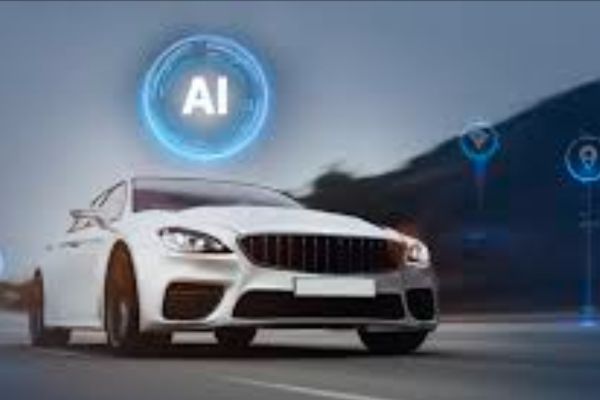Introduction
The automotive industry is undergoing a historic transformation—one powered not by fuel or electricity alone, but by Artificial Intelligence (AI). From enhancing driver safety to enabling fully autonomous vehicles, AI is now the engine behind smarter, safer, and more efficient transportation systems.
As vehicles evolve into intelligent, connected machines, the infusion of AI is no longer an innovation of the future—it is a necessity of the present. AI is revolutionizing how we build, operate, and interact with automobiles, reshaping mobility on a global scale.
AI Applications in the Automotive Landscape
1. Autonomous Driving
Self-driving cars are no longer a dream; they are a fast-approaching reality. AI algorithms process massive inputs from sensors, radar, and LIDAR to detect objects, interpret traffic conditions, and make split-second driving decisions. Companies like Tesla, Waymo, and NVIDIA are leading the way with AI-powered autonomous systems trained on millions of real-world scenarios.
2. Predictive Maintenance
AI models monitor vehicle performance to detect anomalies before they lead to breakdowns. Predictive analytics help manufacturers and fleet managers reduce downtime, lower costs, and extend vehicle lifespan by identifying early signs of engine wear or battery degradation.
3. Driver Monitoring and Safety Systems
Using computer vision and deep learning, in-cabin AI systems can detect drowsiness, distraction, and even emotional states of drivers. This significantly enhances on-road safety by alerting the driver or triggering automatic responses to avoid accidents.
4. Intelligent Infotainment Systems
AI personalizes the in-car experience. Voice assistants respond to natural language commands, while emotion-detection systems adjust music, lighting, and cabin temperature based on the driver’s mood. Brands like BMW and Mercedes-Benz are setting benchmarks in AI-driven infotainment.
5. Smart Traffic and Navigation
AI-powered navigation systems not only find the shortest path but predict traffic congestion using real-time data. Integration with vehicle-to-everything (V2X) communication further enables dynamic route optimization and smart traffic light coordination.
6. AI in Automotive Manufacturing
AI is also reshaping the factory floor. AI-enabled robots perform precision assembly, and computer vision systems conduct real-time quality control, identifying even microscopic defects. Predictive analytics also help optimize supply chains and production timelines.
Real-World Impact
- Mobileye (Intel) uses AI vision systems in millions of cars worldwide for collision avoidance.
- Tata Elxsi and Bosch India are innovating in autonomous technologies tailored for Indian traffic scenarios.
- Startups like Minus Zero are working on affordable AI-powered driverless tech suited for emerging markets.
Challenges and Considerations
Despite its promise, AI in automotive faces several critical challenges:
- Safety & Reliability: AI systems must operate flawlessly in unpredictable real-world conditions.
- Cybersecurity: Connected vehicles are vulnerable to cyber-attacks, necessitating robust security protocols.
- Legal and Ethical Dilemmas: In case of accidents involving autonomous cars, determining liability remains complex.
- Data Privacy: AI depends on real-time personal data, raising concerns about user consent and protection. The Road Ahead
The convergence of AI with 5G, IoT, and edge computing will further accelerate innovation. We foresee:
- L5 Autonomy becoming viable in controlled environments.
- AI-driven EV optimization improving range and battery performance.
- AI integration with smart cities, enabling seamless traffic and energy management.
India, with its vibrant tech ecosystem and automotive manufacturing base, stands on the cusp of becoming a global hub for AI-driven mobility solutions. However, regulatory readiness, infrastructure upgrades, and public trust must grow in parallel.
My Perspective
As an educator and researcher in the Machine Learning domain, I see AI in automotive not just as a technological trend but as a catalyst for societal transformation. It’s critical to equip the next generation of engineers with interdisciplinary skills that blend data science, computer vision, ethics, and automotive engineering.
At Lovely Professional University, we are fostering such future-ready talent by embedding AI into curriculum, research, and industry collaborations. India’s strength will lie not only in adopting AI but in building responsible, inclusive, and localized AI solutions.
A Call to Action
- To policymakers: Frame agile, adaptive regulations that encourage innovation while ensuring safety.
- To industry leaders: Collaborate with academia and startups to co-develop scalable AI platforms.
- To students and researchers: Embrace AI’s vast potential to redefine mobility, not just in luxury cars but in everyday transportation across diverse geographies.
Artificial Intelligence is not just changing how we drive. It’s transforming how we live, move, and connect.
The road ahead is intelligent—and it’s just beginning.













